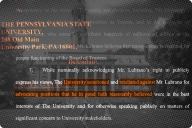You have /5 articles left.
Sign up for a free account or log in.
Just as the Bennet sisters had a season in which to find a spouse, academics have a season in which to cement their editorial couplings for the coming year. Each summer, hotel conference rooms and university campuses around the globe house those who write and those who edit as they perform a series of anxiety-ridden dances.
First, you fill your card.
A year before the conference begins nervous writers apply to appear with panels. Apply for too many and you may end up like Lydia, a cheap tease. Apply for too few and you may spend the summer like Mary, with atonal contributions to recitals meant for others. The perfect panel stretches you just enough beyond your comfort zone to demonstrate new accomplishments but not so far that others outshine you. Elizabeth Bennett shines brightest when accompanied by Jane and Charlotte Lucas. Neither Caroline Bingley nor Kitty improves her lustre.
Upon arrival, you survey the registration hall for familiar faces with whom to pass time before your first dance. Friends exchange updates on their lives, share knowledge of the other attendees, remark upon notable absences, and down coffee in anticipation of the mental aerobics to come.
With panel partners located and caffeinated, you proceed to the appointed space for your performance.
Historians struggle with a particularly stiff line dance. We rise in turn to read our papers. The panel chair punctuates our proclamations with introductions of individual speakers. Then the nervous cluster holds its collective breath and waits for the commentator’s critique.
The commentator will tell the potential editors in the room whether he or she thinks the samples just shared merit further investigation as journal articles or monographs. If the speakers approximate Elizabeth Bennet and the editors Fitzwilliam Darcy, the commentator fills the terrifying role of Lady Catherine de Bourgh.
If the commentator damns with faint praise or skewers with a rapier wit, any recalcitrant editorial Darcy in the audience may slide out the back in silence. If the audience contains a persistent questioner, Wickham, you might draw Darcy’s attention despite Lady Catherine’s condemnation. How you reply to Lady Catherine and Mr. Wickham plays as serious a role in Darcy’s evaluation as quality of your initial performance. If you demonstrate incisive intellect as you respond to critique with poise or to praise with humility, you may just halt Darcy’s departure.
What every writer wants is an invitation to an individual dance - the magic moment when the editor solicits your work solo. A sentence that begins with “your paper” not “your panel” sends the authorial heart into a swoon. For Mr. Darcy to like the ladies of Longbourn in general would offer no special hope to Elizabeth, who needs him to settle upon her in particular.
Of course a successful relationship requires Lizzy to see Darcy’s merits just as Darcy must see Lizzy’s.
An inept proposal or reply can bring the courtship to a premature end. An aloof editor from a high end house poses as many problems as an overeager one from the local historical society. The former might let your prose languish at the bottom of a pile until your colleagues have preempted your finding and made your book redundant. Poor Caroline Bingley’s waits for Darcy’s attention in vain. The latter may push your piece into print before it receives needed editorial polish. Lydia elopes with Wickham before she has read the fine print of his proposal. If like Lizzy, you spurn the aloof editor too soon, you might miss his potential for an attentive partner. Darcy had more depth than she imagined. Set your cap at an editorial Wickham, and you will find he has run off a younger, more naive scholar behind your back.
With luck, a Georgianna Darcy can facilitate the final match. A third party who knows the perils but sees the potential in a tentative romance can assuage lingering doubts and nudge the couple towards the altar.
It is, after all, a truth universally acknowledged, that a scholar in possession of a manuscript, must be in want of an editor.
Evanston, Illinois in the US.
Elizabeth Lewis Pardoe is a member of the University of Venus editorial collective and an associate director of the Office of Fellowships at Northwestern University, where she teaches History and American Studies. For more, follow @ejlp on Twitter or go to http://elizabethlewispardoe.com.








